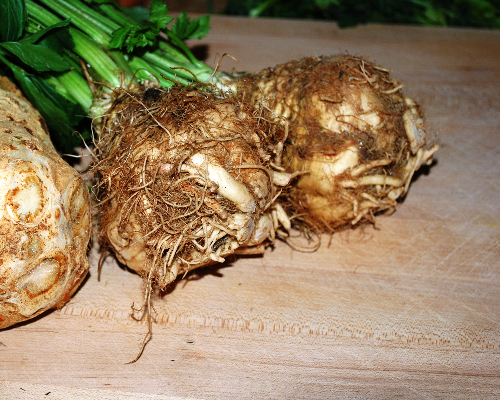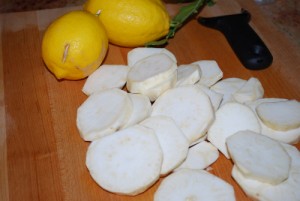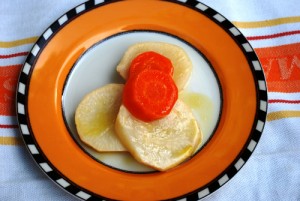For some time now I have been thinking about posting a little spring vegetable often overlooked and yet so delicious and easy to make. Have you every seen those gnarled downright ugly looking bulbous roots with scrawny celery stalks and leaves sticking out of them at a farm market? They smell intensely like celery and when cleaned and peeled the roots are beautiful creamy white with a greenish cast inside. Apio is a Sephardic classic.

Celery roots started appearing at my local farmer’s market a couple of weeks ago, then a reader asked about them and then I realized that this is a classic Passover dish. The light bulb went off in my head and so today, I made them.
5 medium-small celery roots (see picture)
The larger ones are nice looking but their flavor is diluted and texture is not as dense.
1 large carrot (optional)
½ cup fresh lemon juice (round 2 lemons)
2 cups or more of cold water
1 teaspoon salt
2 teaspoons sugar
2 tablespoons olive oil
Cut the stocks and leaves off the celery roots. Peel them until they are clean white bulbs.
Peel the carrot. Slice the roots (apio) and carrot about ¼ to 1/3 inch thick. Place the apio in a heavy bottom sauce pan. Put all the rest of the ingredients in the pan. The liquid should cover the tops of the sliced apio.

 Cover and bring the liquid to a boil, then, lower the heat and simmer for about 1 hour or until the liquid is reduced and the apio is tender. Carefully remove the apio from the sauce. Reduce the sauce down a little more. Place the apio in a glass container with a lid. Add the reduced sauce and refrigerate. Eat apio cold. It is parve and goes equally well with meat, chicken or fish. It keeps refrigerated for many days. Apio is gluten free, and dairy free.
Cover and bring the liquid to a boil, then, lower the heat and simmer for about 1 hour or until the liquid is reduced and the apio is tender. Carefully remove the apio from the sauce. Reduce the sauce down a little more. Place the apio in a glass container with a lid. Add the reduced sauce and refrigerate. Eat apio cold. It is parve and goes equally well with meat, chicken or fish. It keeps refrigerated for many days. Apio is gluten free, and dairy free.







I have seen these in the green grocers over here, yes. I think they call them ‘celeriac’ in Ireland / Europe, but it’s the same as what you’ve described and shown here.
Thanks for the recipe, as I’ve seen them but never knew what to do with them if I did get brave enough to buy one, LOL. Next time I’m in the shops or the farmers’ markets, I’ll take the plunge and try out this very tasty sounding recipe.